UP Population Institute presented papers at the 2025 Philippine Population Association International Scientific Conference in Bicol
The University of the Philippines Population Institute (UPPI) has one of the largest delegations at the recently concluded 2025 Philippine Population Association International Scientific Conference, held at Bicol University from March 6 to 7, 2025. UPPI sent 15 delegates to the event, including all seven faculty members in attendance.
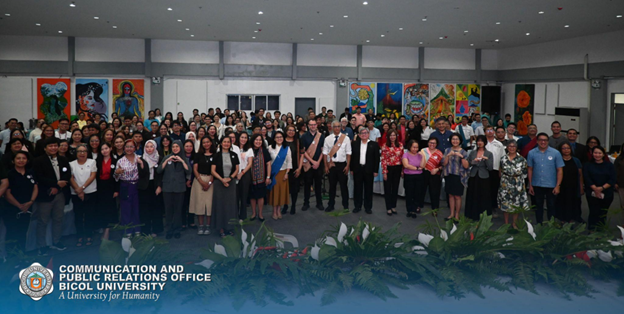
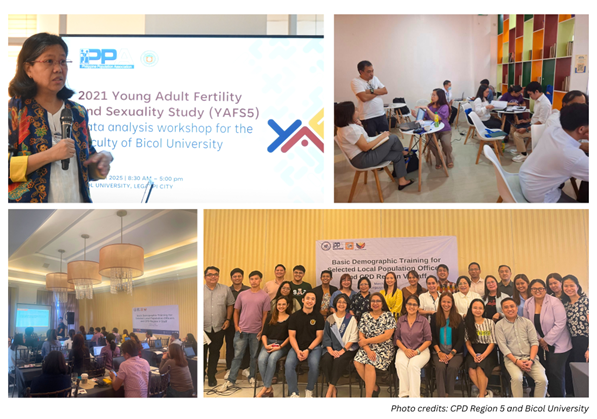
Prior to the main conference, two simultaneous workshops were held on March 5, 2025. One workshop, Techniques of Demographic Analysis, was facilitated by Drs. Grace Cruz and C. Joy Cruz, along with Assistant Professor Mark Ryan Paguirigan. Another workshop, designed for Bicol University faculty members on using the 2021 Young Adult Fertility and Sexuality data, was conducted by Dr. Maria Midea M. Kabamalan and UPPI researchers Jeconiah K. Boongaling and Queenie Rose E. Chico.
Dr. C. Joy P. Cruz, Assistant Professor at the Institute and PPA President, formally opened the conference and emphasized the importance of this annual gathering in sharing new insights and fostering connections among researchers across the country. The event was also attended by renowned demographers Dr. Samir KC, Professor at the Asian Demographic Research Institute, Shanghai University, and Dr. Guy Abel, Professor at the University of Hong Kong.
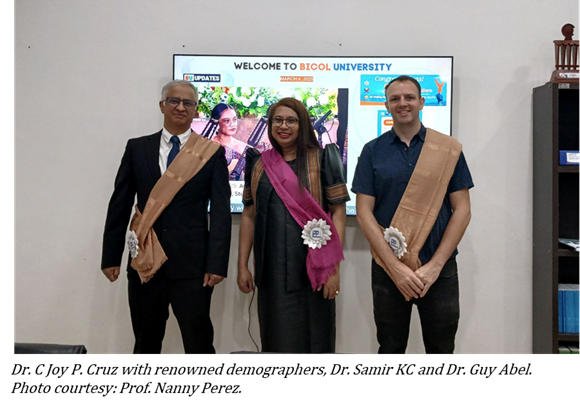
This year’s conference focused on "Education and Population Dynamics: Shaping the Future of Societies." In his keynote address, Dr. Samir KC emphasized that education shapes population dynamics. He noted that, almost universally, women with higher education tend to have fewer children and that better education is linked to lower mortality and improved health. Toward the end of his address, he introduced the theme of Dr. Guy Abel’s lecture on how education also influences migration patterns.
Dr. Guy Abel, in his plenary talk, discussed in detail how education levels among immigrants vary based on a receiving country’s development. He highlighted an important key finding – as countries become more developed, they attract more migrants with secondary or university education and fewer migrants with little to no schooling.
A total of 23 papers were presented during the two-day conference, including seven from UPPI faculty and 16 from current and former students. UPPI also chaired nine out of the 22 sessions.
Dr. C. Joy P. Cruz presented in two parallel sessions: Parallel Session 1A: Surviving and Thriving – The Health, Mortality, and Societal Impact of Older Filipinos (LSAHP Panel) alongside Dr. Grace Cruz and Asst. Prof. Mark Ryan Paguirigan, and Parallel Session 3A: Advancing Population Data and Measurement – Innovations in Vulnerability Mapping, Mobility Estimation, and Survey Quality with Dr. J. Andres Ignacio.
Meanwhile, Assoc. Prof. Maria Paz N. Marquez also presented in two sessions: Parallel Session 3B: The Evolving Lives of Young Filipinos (LCSFC Panel 2) with Dr. Elma P. Laguna, and Parallel Session 4C: Fertility Frontiers – Understanding Trends, Choices, and Policies in the Philippines for her co-authored paper with Dr. Maria Midea Kabamalan.
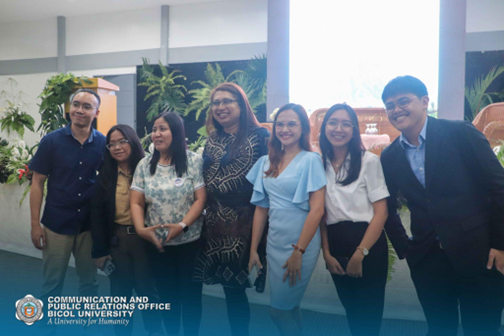
The Institute proudly showcased the work of its graduate students through a dedicated session on the second day of the conference, titled Balancing Dreams and Duties: University Students’ Views on Family, Caregiving, and Career Aspirations. This session was chaired by Assistant Professor Mark Ryan B. Paguirigan. The following papers were presented during this session:
- University Students’ Perspectives on Caregiving Roles: How Sociodemographic Factors and Caregiving Experiences Relate to Attitudes by Michelle C. Lusanta, Daina Rose A. Maningas, and Angelo Rafael B. Nacionales.
- I Do, I Don’t: Family Formation Intentions, Motivations, and Attitudes of Selected UP Diliman Students by Bernard Allan V. Garcia, Leila Marie S. Magno, and Maya Francesca R. Vicencio.
- Fly High: Career Aspirations and Migration Willingness of Selected UP Diliman Students by Camila Christian C. Cruz, Denzell S. Militante, and Keziah D. Odtujan.
Additionally, two recent graduates of the MA Demography program, Mr. Jann Blair P. Salinas and Mr. Nazar M. Mohammadsha from the Philippine Statistics Authority, shared findings from their theses on cohabitation among ever-married youth and the individual and community-level factors associated with fertility preferences, respectively.
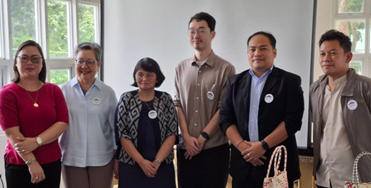
Meanwhile, initial findings from the theses of Mr. Jeconiah K. Boongaling, UPPI University Researcher, on causes of death, and Ms. Queenie Rose E. Chico, UPPI Senior Research Associate, on migration aspirations of young people, were also presented.
The conference concluded with a plenary session featuring two talks: Updates on the 2024 Census of Population and Community-Based Monitoring System (CBMS) by Cynthia L. Perdiz, Regional Director of the Philippine Statistics Authority Region 5, and Best Practices in Using CBMS Data by Maria Rossana R. Gaytano from the Office of the City Mayor, Tabaco City. This session was moderated by UPPI Professor Emeritus Dr. Josefina N. Natividad.
The Institute looks forward to participating in next year’s conference, continuing its commitment to advancing demography and population studies in the country.
Share
